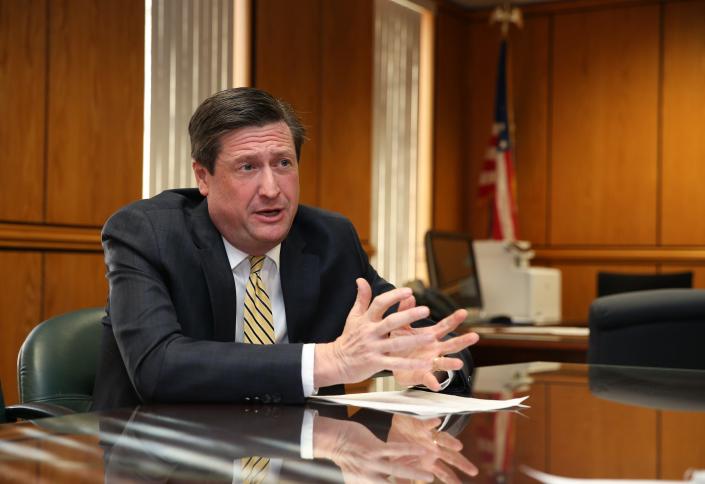Ramapo settles civil rights lawsuit with developer claiming corruption for $3M
RAMAPO – The Ramapo Town Board has approved a mediated legal settlement potentially topping $3 million with a developer who accused town officials of corruption in a 2019 federal civil rights lawsuit.
Connectivity Systems LLC developer Solomon Menche’s lawsuit accused the Ramapo supervisor’s chief of staff, Mona Montal, and other town officials of manipulating land-use decisions pertaining to his mixed-use development. His housing-commercial business plan, known as Hearthstone Village, is off Route 59 in the Remsen Avenue-Treetop Lane neighborhood.
Ramapo Supervisor Michael Specht had called the lawsuit frivolous when Menche filed it in 2019. Specht and other board members voted Wednesday night to settle the legal action, based on a federal mediator’s recommendations. US District Court Judge Cathy Seibel signed off on the agreement.

Specht didn’t return calls for comment on the settlement or the Town Board’s split vote but had the town’s legal counsel comment. Ken Pitcoff declined to discuss the settlement’s details. He’s a partner with the Manhattan firm of Morris, Duffy, Alonzo, Faley & Pitcoff.
Pitcoff said that while Ramapo had strong defenses, the town chose to settle to avoid costly fees, risk a losing verdict at trial, and without admitting fault. Menche’s lawsuit sought $25 million.
Lawsuit settlement: Ramapo and Solomon Menche and Connectivity settle legal action for at least $3 million
“In this federal litigation, the court appointed a mediator to conduct settlement negotiations between the parties,” Pitcoff said. “While the town strongly believes it had viable defenses, continuing to litigate this matter and ultimately going to trial would have been very costly and like any trial, it would have come with significant risk. The decision was made to settle this matter without any admission of fault.”
Connectivity’s attorneys could not be reached.
Details of the lawsuit and settlement
The settlement:
-
Ramapo must pay Connectivity $2 million by July 31.
-
Ramapo must pay Connectivity an additional $1 million by Feb. 28, 2024.
-
Ramapo officials recognize they may not directly or indirectly influence any officials or land-use board members.
-
Menche could potentially get millions of dollars in credits on permits and other approvals for several other developments he has planned.
Menche, a veteran developer who has experienced land-use oversight, will again present his development plan to the Ramapo Town Board. And the town planning staff will exercise their best efforts to review, in good faith, and determine whether the plaintiff’s proposed building heights for Hearthstone are likely to be approved by the land-use boards, according to the settlement.
Ramapo: Developer’s lawsuit claims town corruption blocking his Monsey project
Menche’s Connectivity Systems LLC sought at least $25 million to compensate for losses and damages incurred because of the town’s bad faith and intentional violations of Connectivity’s constitutional rights. The lawsuit names the town, Planning Board, Zoning Board of Appeals, Building Department, and Department of Public Works.
The project faced strong opposition from residents with the Committee for the Preservation of Treetop/Grove/Augusta Neighborhood.
Menche’s argued lawsuit other projects received variances and accommodations that town land-use boards denied Connectivity. The developer requested a variance to construct 56 residential units above commercial stores in three buildings on 6.5 acres. The zoning allowed a maximum of 53 units and a minimum of 48. A fourth building would be commercial.
The settlement sets the groundwork for Menche potentially getting millions of dollars in credits toward permits for the Hearthstone project and other development projects he has pending in Ramapo.
The lawsuit laid out accusations of what it calls the arbitrary Planning Board and Zoning Board of Appeals decisions violating the developer’s constitutional rights and retaliation for refusing to succumb to the town’s illegal demands. The legal action claims Connectivity’s experience is another example in “the well-known annals of the corrupt development process employed by the town.”
Along with traffic, density, and quality of life issues, one concern is focused on eliminating 39 parking spaces. Former Supervisor Christopher St. Lawrence purportedly promised the neighbors the parking would be eliminated in exchange for a larger buffer zone, according to the lawsuit.
Lawsuit’s allegation
In addition to the town’s illegal actions, the lawsuit claims the town’s obstructionist actions include:
-
The Planning Board’s exercise of jurisdiction over issues that were beyond its jurisdiction, even after it was specifically advised not to by its own counsel;
-
The town’s imposition of general requirements of use — such as the number of units allowed per acre — on only Hearthstone and on no other similarly situated projects within the same zone;
-
Forcing only Connectivity, but not other similarly situated projects, to install a costly soundproof fence and to plant rows of evergreen trees and landscaping in an enlarged buffer between Hearthstone and a residential area, even though the other similarly situated projects are closer and more visible to residences of Hearthstone;
-
Consistently delayed the issuance of decisions, approvals, or amended resolutions relating to Hearthstone, including once delaying for 18 months for preparation and filing of the pro forma ZBA resolution, a delay that caused another 18 months of further delay;
-
Refusing to perform routine inspections or issue building permits. The state courts had to direct the building inspector to review Connectivity’s building plans;
-
Issuing administrative agency decisions unsupported by the town’s own consultants, any factually objective evidence, and contradicted by the agency’s prior findings;
-
The new building inspector changed his predecessor’s binding zoning law interpretation that two buildings with an underground connection were two separate buildings, and concluded that the same two buildings were one building, long after site plan approval, without any citation of the zoning law;
Attempts to influence land-use decisions claimed
The legal action also claims Montal and others “tried to strong-arm Mr. Menche into removing (the parking spaces), let him encounters trouble with Hearthstone.”

“There is no other explanation for the number of times that the town has strongly-armed and strangled Connectivity with extortionate demands and penalties for non-compliance,” according to the lawsuit filed in the US District Court in White Plains by Joshua J. Grauer and Jordan Brooks of Cuddy & Feder in White Plains.
Montal made good on her threat, according to the lawsuit. The legal action cites an email on March 14, 2019, in which a former town attorney advised the neighbors not to reveal Montal as a recipient of a letter to the building inspector that included the neighbors’ demands and the supervisor/neighbors’ deal.
The state courts have sided with Menche’s company three times in overruling town land-use boards’ decisions on variances and site plan approvals. The state court ruled as recently as May 13, 2020, that the Planning Board and ZBA again acted illegally and annulled the Planning Board’s denial of an updated site plan.
The Town Board changed the zoning to allow for mix-use residential and commercial development in 2013. The Hearthstone site abuts commercial zoning to the west, residential zoning to the north, residential to the east, and most commercial zoning to the south. It received zoning variances on March 14, 2014, and planning board approval on October 21, 2014.
Specht defended the town
At the time of the lawsuit, Specht defended the town and Montal, who is also the town purchasing director and chair of the Ramapo Democratic Party.
“I don’t think there’s any merit to the legal action,” Specht said.
Steve Lieberman covers government, breaking news, courts, police, and investigations. Reach him at [email protected]. Twitter: @lohudlegal.
Read more articles and bio. Our local coverage is only possible with support from our readers.
This article originally appeared on Rockland/Westchester Journal News: Ramapo settles federal suit with developer claiming corruption for $3M
